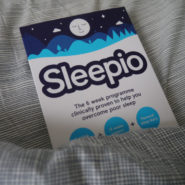According to Dr. Brent Pawlecki, the goal of his Thursday morning presentation here at Human Resource Executive‘s Health & Benefits Leadership Conference (held April 19 – 21 at the Aria Resort & Casino in Las Vegas) was to “make the case for why sleep is important” to employees’ health.
Making that case was also part of his plan when he took over as chief health officer at Akron, Ohio-based Goodyear Tire and Rubber Co. six years ago.
At the time, the company has begun investing more in the health of its 69,000 employees around the world. Pawlecki was brought in to “build a culture of health” at the organization. When he took the job in 2011, he was charged with helping Goodyear to better define its overall healthy strategy.
“We said, we’re a global company, with well over 20,000 U.S.-based employees,” says Pawlecki. “We need to build a strong foundation of healthy employees here in the U.S.”
Part of that building process was addressing the impact of sleep, or the lack thereof, on Goodyear employees. Why study sleep?
“I was at a conference where I attended a presentation on how sleep affects workers,” says Pawlecki. “And I thought that, if we can get our employees thinking and talking about sleep issues—which could be caused by or contributing to underlying health issues— then maybe we can get them to focus on those larger issues.”
Enter Big Health, the San Francisco-based provider of the Sleepio sleep health app.
Sharing the stage with Pawlecki was Jenna Carl, medical director at Big Health. She talked about the “hidden nature” of behavioral health problems, and how tackling sleep issues might “offer a gateway to solving mental health problems” and subsequently creating healthier and happier workers.
Those suffering from insomnia, for instance, often find themselves more easily irritated and more sensitive to stress, she says.
“Insomnia also affects the frontal cortex—the CEO of the brain—which is responsible for decision making,” continues Carl. “And, behaviorally, those with sleep problems fall into a vicious cycle. They start worrying about not sleeping, and/or might start using more caffeine or alcohol, which actually have a negative impact on the ability to sleep.”
Naturally, employees trying to work their way through such problems are going to be less than their best while on the job. Pawlecki and Goodyear were acutely aware of this reality when bringing in Big Health to help conduct a sleep awareness campaign, “designed to engage good and poor sleepers,” says Carl.
The campaign began with encouraging employees to take a sleep test, the results of which led to creating personalized plans for employees who took part.
In getting employees to participate, “it’s important to know your employee population in order to know how to reach them,” says Carl.
Goodyear, for example, has 24,000 U.S. employees spread across plants and retail locations. Roughly 60 percent of these associates have no company email address, says Pawlecki.
As such, the initial sleep awareness campaign included home mailers and in-person communications in the form of posters and animated videos geared toward these workers, as well as providing intranet articles and sending emails detailing the campaign to those with Goodyear email accounts.
Overall, the campaign netted 2,798 employees who completed the sleep test, the majority of whom suffered from poor sleep, says Carl, adding that about one third of these workers could meet the clinical criteria for insomnia, while around half were experiencing less-than-optimal sleep. Plant workers, she says, struggled the most.
These plant employees also reported that poor sleep impacted their productivity close to 28 percent of the time, with retail workers saying that sleep affects their productivity 23 percent of the time. Office workers said that inadequate rest took a toll on their work 21 percent of the time.
“This is a pretty significant impact,” says Carl, adding that Goodyear employees who used the Sleepio app and underwent cognitive therapy reported getting an additional five hours of sleep per week after using the application. Those same workers also saw their stress reduced by 54 percent, and experienced a 35 percent drop in anxiety.
“These are obviously big improvements,” says Carl, noting that these workers also reported productivity improvements in addition to improving their overall mental health.
“And that’s just from getting better sleep.”


